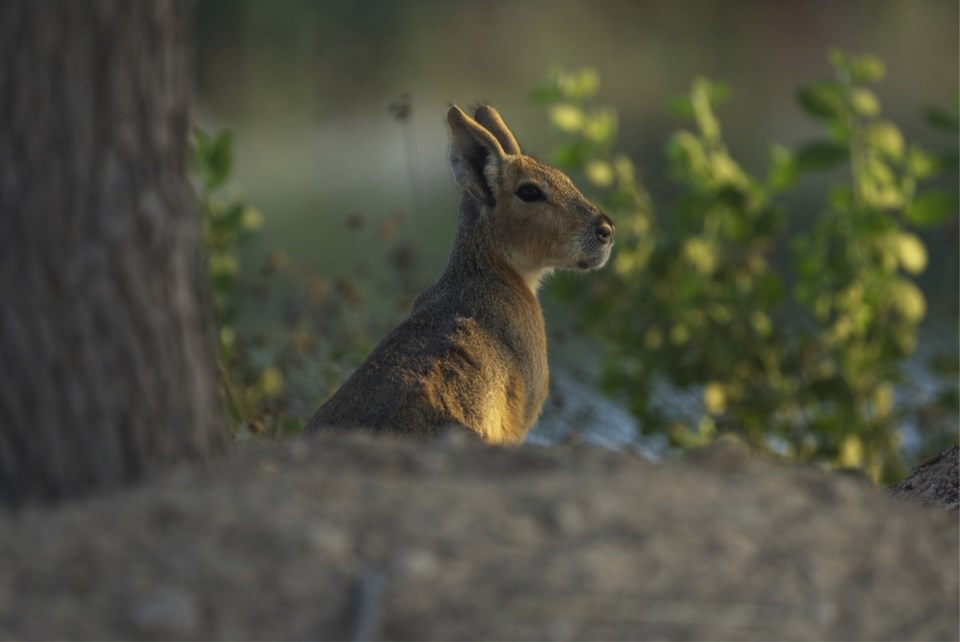AL QUDRA LAKES, United Arab Emirates (AP) — A desert oasis hidden away in the dunes in the far reaches of skyscraper-studded Dubai has drawn a surprising new set of weary world travelers: a pack of Argentinian rodents.
A number of Patagonian mara, a rabbit-like mammal with long legs, big ears and a body like a hoofed animal, now roam the grounds of Al Qudra Lakes, typically home to gazelle and other desert creatures of the United Arab Emirates.
How they got there remains a mystery in the UAE, a country where exotic animals have ended up in the private homes and farms of the wealthy. But the pack has already survived several years in a network of warrens among the dunes.
The UAE's Climate Change and Environment Ministry and authorities in Dubai did not respond to questions from The Associated Press about the Patagonian maras' presence. One estimate suggests that as many as 200 could be thriving in the area and the wider Al Marmoom Desert Conservation Reserve nearby, as only a few dead maras have been found.
An AP journalist happened upon at least five maras on a recent visit to Al Qudra Lakes, a vast desert area some 40 kilometers (25 miles) south of downtown Dubai. On another visit, he saw multiple packs of the animals, including one mother still nursing a baby.
Al Qudra sits at the end of a long bicycle track popular in the winter months and draws campers and others who enjoy the outdoors in the cooler weather among the area's lakes. Some have been manmade into the shapes of a crescent moon, two hearts or even an advertisement for Dubai's Expo 2020.
The Patagonian maras first appeared publicly in 2020 during the height of the coronavirus pandemic. A request for information on their sightings first made a summertime issue of the Dubai Natural History Group's monthly newsletter, with volunteers describing them as being seen both in Al Qudra and on Saadiyat Island near the country's capital of Abu Dhabi.
“This large rodent is a common species in zoological collections and undoubtedly found its way out from captivity," wrote Jacky Judas, who long has studied mammals in the UAE, in a chapter in the recent book “A Natural History of the Emirates."
"They can regularly be seen sleeping or eating grass in the middle of roundabouts at Al Qudra. This species is not adapted to live in arid environment, although in the absence of his usual predators, like pumas, it can possibly survive in highly modified habitats with tree plantations, lawns and ponds,” Judas wrote.
That's the exact environment found at Al Qudra — likely contributing to the maras' continued survival there despite temperatures in the UAE regularly reaching 45 degrees Celsius (113 degrees Fahrenheit) in the summer with high humidity.
The number at Al Qudra also suggests they are breeding. Patagonian maras mate for life and females only enter heat a few times a year for about 30 minutes apiece. They can give birth to one to three offspring at a time. In Argentina, the animals can be hunted and eaten, their fur used for rugs and blankets.
While the Patagonia maras are herbivores and pose no threat to humans, they likely have very few predators at Al Qudra. Arabian red fox do live and hunt in the area.
How the Patagonian maras got there remains a mystery. Maras are on display at the children's section of the Dubai Safari Park zoo, but at the same distance from Al Qudra as downtown. There are surrounding tracks and farms owned by Dubai's elite near Al Qudra, which suggests the maras escaped either overland or through digging their way out of a nearby property.
Patagonian maras, which typically live in central and southern Argentina, have been trafficked into areas as exotic pets in the past. In Lakewood, Colorado, a suburb of Denver, the appearance of one sparked wide local news coverage earlier this year. However, the animal is now believed by authorities to be dead. In August, a Patagonian mara was found in the trunk of a car carrying other animals trying to enter Turkey from Greece in a suspected trafficking attempt.
Though it is illegal to keep endangered or threatened wildlife as pets in the Emirates, there have been numerous sightings and social media videos of Emirati men in luxury cars accompanied by pet lions along for the cruise. In 2021, authorities put out a warning that a “wild cat” had been seen loose in one neighborhood.
Jon Gambrell, The Associated Press



